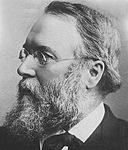
Johan Sverdrup was a Norwegian politician from the Liberal Party. He was the first prime minister of Norway after the introduction of parliamentarism and served as the fourth prime minister of Norway. Sverdrup was prime minister from 1884 to 1889.

The Liberal Party is a social liberal political party in Norway. It was founded in 1884 and is the oldest political party in Norway. It is positioned in the centre on the political spectrum, and it is a liberal party which has over the time enacted reforms such as parliamentarism, freedom of religion, universal suffrage, and state schooling.

Federal elections were held in Germany on 28 October 1884. The Centre Party remained the largest party in the Reichstag, with 99 of the 397 seats. Voter turnout was 60.5%.
The Democratic Party is a centre-right political party in Bulgaria led by Alexander Pramatarski. The party was a member of the European People's Party (EPP).

Jakob Liv Rosted Sverdrup was a Norwegian bishop and politician. Born into a prominent local family and well-educated, Jakob followed in the footsteps of his father Harald Ulrik Sverdrup and his uncle Johan Sverdrup by pursuing both a theological and political life. He served five terms in the Norwegian Parliament between 1877 and 1898, and was a cabinet member on several occasions. Originally a member of the Liberal Party, he later joined the Moderate Liberal Party, having partially been the cause of the split that formed the Moderate Liberal Party. He has been referred to as "one of the most controversial figures in modern Norwegian history".

General elections were held in Belgium on 26 March 1961. The result was a victory for the Christian Social Party, which won 96 of the 212 seats in the Chamber of Representatives and 47 of the 106 seats in the Senate. Voter turnout was 92.3%. Elections for the nine provincial councils were also held.
Parliamentary elections were held in Norway in 1882. Although political parties were not officially established until 1884, there were two broad movements already in existence - one supporting the Swedish King and the existing system, and one demanding reform.
Parliamentary elections were held in Norway in 1879. The elections were not held on a specific date, as the various cities and Amts held the election at their own choice. Instead, the elections stretched from June to several months later. Voting rights were highly limited, as women were not allowed to vote and there were strong restrictions on men's ability to vote. It has been estimated that only 2.5% of the population of Christiania (Oslo), and 4.6% of the national population, was eligible to vote. The national election turnout was 48.7%, and 114 representatives were elected for the Norwegian Parliament, an increase of three seats compared to the Storting elected in 1876.
Full general elections were held in Belgium on 2 June, 1912.

Partial general elections were held in Belgium on 24 May 1914. The result was a victory for the Catholic Party, which won 41 of the 88 seats up for election in the Chamber of Representatives.

Full general elections were held in Belgium on 13 June 1848. They followed an equalisation of the tax qualifications for voters, which widened the franchise from 1.0% of the population to 1.8%. Unlike the previous rules which had favoured Conservatives and Catholics, this benefitted the Liberal Party and damaged the Catholics, who lost more than half their seats.

Parliamentary elections were held in Bulgaria on 27 May 1884. The result was a victory for the Liberal Party, which won 100 of the 171 seats. Voter turnout was 28.9%. Further members were elected from Eastern Rumelia between 11 and 18 May 1886, after it became part of Bulgaria in 1885.
Parliamentary elections were held in Norway in 1859. As political parties were not officially established until 1884, all those elected were independents. The number of seats in the Storting was increased from 111 to 117. Voter turnout was 48%, although only 5% of the country's population was eligible to vote.

The People's Liberal Party was a political party in Bulgaria.

The Liberal Party was a political party in Bulgaria and the main force in domestic politics between independence in 1878 and the mid-1880s when it dissolved into several different factions.
The Progressive Liberal Party was a political party in Bulgaria.

The Liberal Party, also known as the Radoslavists was a political party in Bulgaria from 1887 until 1920.
The People's Party was a political party in Bulgaria between 1894 and 1920.
The National Liberal Party was a political party in Estonia.
The Party of Independence and '48, also known mostly by its shortened form Independence Party, was one of the two major political parties in the Kingdom of Hungary within Austria-Hungary, along with the Liberal Party then National Party of Work. During its existence, the F48P strongly opposed the Austro-Hungarian Compromise of 1867. The party was revived after the fall of the Hungarian Soviet Republic and restoration of the monarchy.










